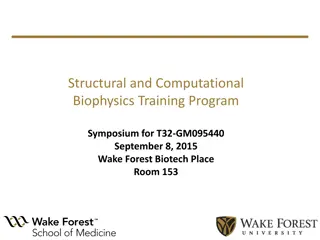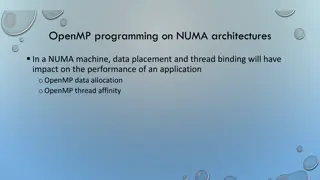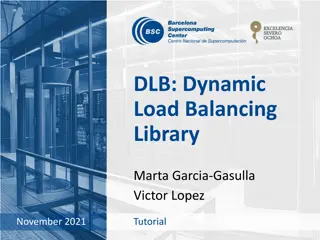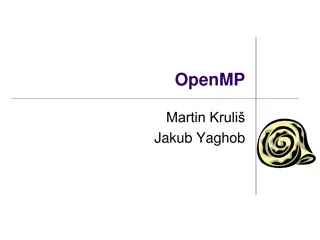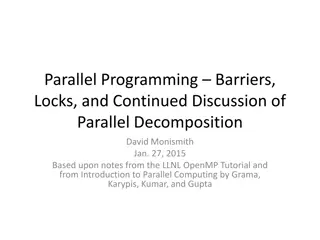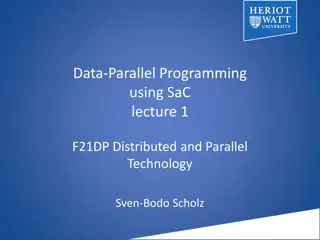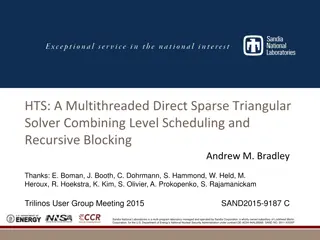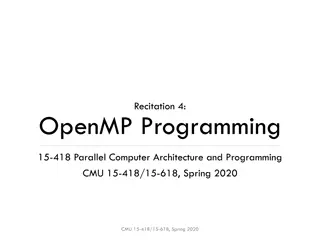
Advanced Shared Memory Programming in OpenMP for Research Computing
"Explore the intricacies of shared-memory programming in OpenMP for advanced research computing. Learn about the fork-join model of parallelism, communication methods, advantages, disadvantages, and practical examples to enhance your parallel programming skills."
Download Presentation

Please find below an Image/Link to download the presentation.
The content on the website is provided AS IS for your information and personal use only. It may not be sold, licensed, or shared on other websites without obtaining consent from the author. If you encounter any issues during the download, it is possible that the publisher has removed the file from their server.
You are allowed to download the files provided on this website for personal or commercial use, subject to the condition that they are used lawfully. All files are the property of their respective owners.
The content on the website is provided AS IS for your information and personal use only. It may not be sold, licensed, or shared on other websites without obtaining consent from the author.
E N D
Presentation Transcript
Shared-Memory Programming in OpenMP Advanced Research Computing
Outline What is OpenMP? How does OpenMP work? Architecture Fork-join model of parallelism Communication OpenMP constructs Directives Runtime Library API Environment variables
What is OpenMP? API for parallel programming on shared memory systems Parallel threads Implemented through the use of: Compiler Directives Runtime Library Environment Variables Supported in C, C++, and Fortran Maintained by OpenMP Architecture Review Board (http://www.openmp.org/)
Advantages Code looks similar to sequential Relatively easy to learn Adding parallelization can be incremental No message passing Coarse-grained or fine-grained parallelism Widely-supported
Disadvantages Scalability limited by memory architecture To a single node (8 to 32 cores) on most machines Managing shared memory can be tricky Improving performance is not always guaranteed or easy
Shared Memory Memory P P P P P Your laptop Multicore, multiple memory NUMA system HokieOne (SGI UV) One node on a hybrid system
Fork-join Parallelism Parallelism by region Master Thread: Initiated at run-time & persists throughout execution Assembles team of parallel threads at parallel regions time Serial Parallel Parallel Serial Serial execution 4 CPU 6 CPU Master Thread Multi-Threaded
How do threads communicate? Every thread has access to global memory (shared). Each thread has access to a stack memory (private). Use shared memory to communicate between threads. Simultaneous updates to shared memory can create a race condition. Results change with different thread scheduling. Use mutual exclusion to avoid data sharing - but don t use too many because this will serialize performance.
Race Conditions Example: Two threads ( T1 & T2 ) increment x=0 Start: x=0 1. T1 reads x=0 2. T1 calculates x=0+1=1 3. T1 writes x=1 4. T2 reads x=1 5. T2 calculates x=1+1=2 6. T2 writes x=2 Start: x=0 1. T1 reads x=0 2. T2 reads x=0 3. T1 calculates x=0+1=1 4. T2 calculates x=0+1=1 5. T1 writes x=1 6. T2 writes x=1 Result: x=2 Result: x=1
OpenMP Constructs OpenMP language extensions runtime functions, env. variables parallel control structures data synchronization work sharing environment distributes work among threads specifies variables as shared or private coordinates thread execution Runtime environment governs flow of control in the program omp_set_num_threads() omp_get_thread_num() OMP_NUM_THREADS OMP_SCHEDULE do/parallel do and Section directives critical and atomic directives barrier directive shared and private clauses parallel directive
OpenMP Directives OpenMP directives specify parallelism within source code: C/C++: directives begin with the # pragma omp sentinel. FORTRAN: Directives begin with the !$OMP, C$OMP or *$OMP sentinel. F90: !$OMP free-format Parallel regions are marked by enclosing parallel directives Work-sharing loops are marked by parallel do/for Fortran !$OMP parallel ... !$OMP end parallel C/C++ # pragma omp parallel {...} !$OMP parallel do DO ... !$OMP end parallel do # pragma omp parallel for for(){...} 14
API: Functions Function omp_get_num_threads() omp_get_thread_num() omp_get_num_procs() Description Returns number of threads in team Returns thread ID (0 to n-1) Returns number of machine CPUs True if in parallel region & multiple threads executing Changes number of threads for parallel region omp_in_parallel() omp_set_num_threads(#) Function omp_get_dynamic() Description True if dynamic threading is on. Set state of dynamic threading (true/false) omp_set_dynamic() 15
API: Environment Variables OMP_NUM_THREADS: Number of Threads OMP_DYNAMIC: TRUE/FALSE for enable/disable dynamic threading 16
Parallel Regions 1 !$OMP PARALLEL 2 code block 3 call work( ) 4 !$OMP END PARALLEL Line 1: Team of threads formed at parallel region Lines 2-3: Each thread executes code block and subroutine calls No branching (in or out) in a parallel region Line 4: All threads synchronize at end of parallel region (implied barrier).
Example: Hello World Update a serial code to run on multiple cores using OpenMP 1. Start from serial Hello World example: hello.c, hello.f 2. Create a parallel region 3. Identify individual threads and print out information from each
Hello World in OpenMP Fortran: !$OMP PARALLEL INTEGER tid tid = OMP_GET_THREAD_NUM() PRINT *, Hello from thread = , tid !$OMP END PARALLEL C: #pragma omp parallel { int tid; tid = omp_get_thread_num(); printf( Hello from thread =%d\n , tid); }
Compiling with OpenMP GNU uses fopenmp flag gcc program.c -fopenmp o runme g++ program.cpp fopenmp o runme gfortran program.f fopenmp o runme Intel uses openmp flag, e.g. icc program.c -openmp o runme ifort program.f openmp o runme
Parallel Region/Work Sharing Use OpenMP directives to specify Parallel Region and Work-Sharing constructs. Code block DO Work Sharing SECTIONS SINGLE MASTER CRITICAL Each Thread Executes Parallel Work Sharing One Thread Only the master thread One Thread at a time End Parallel Parallel DO/for Parallel SECTIONS Stand-alone Parallel Constructs
OpenMP parallel constructs PARALLEL {code1} DO do I = 1,N*4 {code2} end do END DO {code3} END PARALLEL PARALLEL DO do I = 1,N*4 {code} end do END PARALLEL DO PARALLEL {code} END PARALLEL code1 code1 code1 code1 code1 code1 code1 code1 I=1,N I=1,N code code I=N+1,2N I=N+1,2N code code I=2N+1,3N I=2N+1,3N code code I=3N+1,4N I=3N+1,4N code code code code code code code code code code I=1,N I=1,N code2 code2 I=N+1,2N I=N+1,2N code2 code2 I=2N+1,3N I=2N+1,3N code2 code2 I=3N+1,4N I=3N+1,4N code2 code2 code3 code3 code3 code3 code3 code3 code3 code3 Replicated Work Sharing Combined
More about OpenMP parallel regions There are two OpenMP modes staticmode Fixed number of threads dynamicmode: Number of threads can change under user control from one parallel region to another (using OMP_set_num_threads) Specified by setting an environment variable (csh) setenv OMP_DYNAMIC true (bash) export OMP_DYNAMIC=true Note: the user can only define the maximum number of threads, compiler can use a smaller number
Parallel Constructs PARALLEL: Create threads, any code is executed by all threads DO/FOR: Work sharing of iterations SECTIONS: Work sharing by splitting SINGLE: Only one thread CRITICAL or ATOMIC: One thread at a time MASTER: Only the master thread
The DO / for directive Fortran: !$OMP PARALLEL DO do i=0,N C do some work enddo !$OMP END PARALLEL DO C: #pragma omp parallel for { for (i=0; i<N; i++) // do some work }
The DO / for Directive 1 !$OMP PARALLEL DO 2 do i=1,N 3 a(i) = b(i) + c(i) 4 enddo 5 !$OMP END PARALLEL DO Line 1 Team of threads formed (parallel region). Line 2-4 Loop iterations are split among threads. Line 5 (Optional) end of parallel loop (implied barrier at enddo). Each loop iteration must be independent of other iterations.
The Sections Directive Different threads will execute different code Any thread may execute a section #pragma omp parallel { #pragma omp sections { #pragma omp section { // do some work } #pragma omp section { // do some different work } } // end of sections } // end of parallel region
Merging Parallel Regions The !$OMP PARALLEL directive declares an entire region as parallel. Merging work-sharing constructs into a single parallel region eliminates the overhead of separate team formations. !$OMP PARALLEL !$OMP DO do i=1,n a(i)=b(i)+c(i) enddo !$OMP END DO !$OMP DO do i=1,m x(i)=y(i)+z(i) enddo !$OMP END DO !$OMP END PARALLEL !$OMP PARALLEL DO do i=1,n a(i)=b(i)+c(i) enddo !$OMP END PARALLEL DO !$OMP PARALLEL DO do i=1,m x(i)=y(i)+z(i) enddo !$OMP END PARALLEL DO
OpenMP clauses Control the behavior of an OpenMP directive: Data scoping (Private, Shared, Default) Schedule (Guided, Static, Dynamic, etc.) Initialization (e.g. COPYIN, FIRSTPRIVATE) Whether to parallelize a region or not (if- clause) Number of threads used (NUM_THREADS)
Private and Shared Data Shared: Variable is shared (seen) by all processors. Private: Each thread has a private instance (copy) of the variable. Defaults: All DO LOOP indices are private, all other variables are shared. !$OMP PARALLEL DO SHARED(A,B,C,N) PRIVATE(i) do i=1,N A(i) = B(i) + C(i) enddo !$OMP END PARALLEL DO 31
Private data example In the following loop, each thread needs its own PRIVATE copy of TEMP. If TEMP were shared, the result would be unpredictable since each processor would be writing and reading to/from the same memory location. !$OMP PARALLEL DO SHARED(A,B,C,N) PRIVATE(temp,i) do i=1,N temp = A(i)/B(i) C(i) = temp + cos(temp) enddo !$OMP END PARALLEL DO A lastprivate(temp) clause will copy the last loop(stack) value of temp to the (global) temp storage when the parallel DO is complete. A firstprivate(temp)would copy the global temp value to each stack s temp. 32
Data Scoping Example (Code) int tid, pr=-1, fp=-1, sh=-1, df=-1; printf("BEGIN: pr is %d, fp is %d, sh is %d, df is %d.\n",pr,fp,sh,df); #pragma omp parallel shared(sh) private(pr,tid) firstprivate(fp) { tid = omp_get_thread_num(); printf("Thread %d START : pr is %d, fp is %d, sh is %d, df is %d.\n",tid,pr,fp,sh,df); pr = tid * 4; fp = pr; sh = pr; df = pr; printf("Thread %d UPDATE: pr is %d, fp is %d, sh is %d, df is %d.\n",tid,pr,fp,sh,df); } /* end of parallel section */ printf("END: pr is %d, fp is %d, sh is %d, df is %d.\n",pr,fp,sh,df);
Data Scoping Example (Code) $ icc -openmp omp_scope.c -o omp_scope $ ./omp_scope BEGIN: pr is -1, fp is -1, sh is -1, df is -1. Thread 0 START : pr is 0, fp is -1, sh is -1, df is -1. Thread 1 START : pr is 0, fp is -1, sh is -1, df is -1. Thread 1 UPDATE: pr is 4, fp is 4, sh is 4, df is 4. Thread 2 START : pr is 0, fp is -1, sh is -1, df is -1. Thread 2 UPDATE: pr is 8, fp is 8, sh is 8, df is 8. Thread 0 UPDATE: pr is 0, fp is 0, sh is 0, df is 0. Thread 3 START : pr is 0, fp is -1, sh is 8, df is 8. Thread 3 UPDATE: pr is 12, fp is 12, sh is 12, df is 12. END: pr is -1, fp is -1, sh is 12, df is 12.
Distribution of work - SCHEDULE Clause !OMP$ PARALLEL DO SCHEDULE(STATIC) Each CPU receives one set of contiguous iterations (~total_no_iterations /no_of_cpus). !OMP$ PARALLEL DO SCHEDULE(STATIC,C) Iterations are divided round-robin fashion in chunks of size C. !OMP$ PARALLEL DO SCHEDULE(DYNAMIC,C) Iterations handed out in chunks of size C as CPUs become available. !OMP$ PARALLEL DO SCHEDULE(GUIDED,C) Each of the iterations are handed out in pieces of exponentially decreasing size, with C minimum number of iterations to dispatch each time (Important for load balancing.)
Load Imbalances Thread 0 Unused Resources Thread 1 Thread 2 Thread 3 Time
Example - SCHEDULE(STATIC,16) !$OMP parallel do schedule(static,16) do i=1,128 !OMP_NUM_THREADS=4 A(i)=B(i)+C(i) enddo thread0: do i=1,16 A(i)=B(i)+C(i) enddo do i=65,80 A(i)=B(i)+C(i) enddo thread2: do i=33,48 A(i)=B(i)+C(i) enddo do i = 97,112 A(i)=B(i)+C(i) enddo thread1: do i=17,32 A(i)=B(i)+C(i) enddo do i = 81,96 A(i)=B(i)+C(i) enddo thread3: do i=49,64 A(i)=B(i)+C(i) enddo do i = 113,128 A(i)=B(i)+C(i) enddo
Scheduling Options Static PROS Low compute overhead No synchronization overhead per chunk Takes better advantage of data locality Dynamic PROS Potential for better load balancing, especially if chunk is low CONS Higher compute overhead Synchronization cost associated per chunk of work CONS Cannot compensate for load imbalance
Scheduling Options When shared array data is reused multiple times, prefer static scheduling to dynamic !$OMP parallel private (i,j,iter) do iter=1,niter ... !$OMP do do j=1,n do i=1,n A(i,j)=A(i,j)*scale end do end do ... end do !$OMP end parallel Every invocation of the scaling would divide the iterations among CPUs the same way for static but not so for dynamic scheduling 39
Comparison of scheduling options static or dynamic compute overhead name type chunk chunk size chunk # simple static simple no N/P P static lowest interleaved simple yes C N/C static low simple dynamic dynamic optional C N/C dynamic medium decreasing from N/P fewer than N/C guided guided optional dynamic high runtime runtime no varies varies varies varies
Matrix Multiplication - Serial /*** Initialize matrices ***/ for (i=0; i<NRA; i++) for (j=0; j<NCA; j++) a[i][j]= i+j; [etc also initialize b and c] /*** Multiply matrices ***/ for (i=0; i<NRA; i++) for(j=0; j<NCB; j++) for (k=0; k<NCA; k++) c[i][j] += a[i][k] * b[k][j];
Example: Matrix Multiplication Parallelize matrix multiplication from serial: C version: mm.c Fortran version: mm.f 1. Use OpenMP to parallelize loops 2. Determine public / private variables 3. Decide how to schedule loops
Matrix Multiplication - OpenMP /*** Spawn a parallel region explicitly scoping all variables ***/ #pragma omp parallel shared(a,b,c,nthreads,chunk) private(tid,i,j,k) { tid = omp_get_thread_num(); /*** Initialize matrices ***/ #pragma omp for schedule (static, chunk) for (i=0; i<NRA; i++) for (j=0; j<NCA; j++) a[i][j]= i+j; #pragma omp for schedule (static, chunk) for (i=0; i<NRA; i++) { printf("Thread=%d did row=%d\n",tid,i); for(j=0; j<NCB; j++) for (k=0; k<NCA; k++) c[i][j] += a[i][k] * b[k][j]; } }
Matrix Multiplication: Work Sharing Partition by rows: =
Reduction Clause Thread-safe way to combine private copies of a variable into a single result Variable that accumulates the result is the reduction variable After loop execution, master thread collects private values of each thread and finishes the (global) reduction Reduction operators and variables must be declared 46
Nowait Clause When a work-sharing region is exited, a barrier is implied - all threads must reach the barrier before any can proceed. By using the NOWAIT clause at the end of each loop inside the parallel region, an unnecessary synchronization of threads can be avoided. !$OMP PARALLEL !$OMP DO do i=1,n work(i) enddo !$OMP END DO NOWAIT !$OMP DO schedule(dynamic,M) do i=1,m x(i)=y(i)+z(i) enddo !$OMP END DO !$OMP END PARALLEL 49
Barriers Create a barrier to synchronize threads #pragma omp parallel { // all threads do some work #pragma omp barrier // all threads do more work } Barrier is implied at the end of a parallel region 50
Mutual Exclusion: Critical/Atomic Directives ATOMIC For a single command (e.g. incrementing a variable) CRITICAL Directive: Longer sections of code !$OMP PARALLEL SHARED(sum,X,Y) ... !$OMP CRITICAL call update(x) call update(y) sum=sum+1 !$OMP END CRITICAL ... !$OMP END PARALLEL !$OMP PARALLEL SHARED(X,Y) ... !$OMP ATOMIC sum=sum+1 ... !$OMP END PARALLEL CRITICAL section Master Thread 51
Mutual exclusion: lock routines When each thread must execute a section of code serially, locks provide a more flexible way of ensuring serial accessthan CRITICAL and ATOMIC directives call OMP_INIT_LOCK(maxlock) !$OMP PARALLEL SHARED(X,Y) ... call OMP_set_lock(maxlock) call update(x) call OMP_unset_lock(maxlock) ... !$OMP END PARALLEL call OMP_DESTROY_LOCK(maxlock) 52



